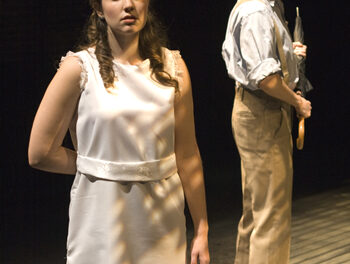We begin and end our journey with music.
This music is a melancholy guitar motif that appears throughout UNC School of the Arts‘ high quality production of Pericles. It sets the mood at the beginning of the play, as does the narration by our guide, Gower, with a soft sound that seems to speak from the heart and the human spirit, which this production celebrates.
Pericles is not performed as often as Romeo and Juliet or Hamlet, yet in recent years has gained a respectable reputation thanks to high-caliber productions by Bartlett Sher and even UNC’s own Joseph Haj. Haj’s Pericles, which he directed both at PlayMakers and the Oregon Shakespeare Festival, was so well received that he also mounted a production in Minneapolis in January after assuming the position of Artistic Director at The Guthrie.
At the start of the play, we find Pericles in Antioch, ruled by King Antiochus. Pericles manages to unravel a riddle to win the hand of Antiochus’ daughter. In unraveling the riddle, Pericles discovers that Antiochus has led his daughter into incest, and flees out of fear of being a murdered by the king.
He embarks on a sea voyage and lands on the poverty-stricken shores of Tarsus, bringing food to the starved citizens and gaining the trust of the governor Cleon and his wife. After finding out Antiochus’ assassins are still in pursuit of him, Pericles flees and washes up onto the shores of Pentapolis, where he woos King Simonides’ daughter Thaisa.
While traveling back to Tyre upon hearing the news that Antiochus and his wife are dead, Thaisa goes into labor and dies in childbirth. Out of superstition, the sailors throw her body overboard, where it lands on the island Ephesus, leading a medicine man to resurrect her back to life. Meanwhile, Pericles leaves his newborn in the care of Cleon and his wife in Tarsus and becomes a hermit.
And this all happens before intermission.
Whether in human comedy or historical tragedy, Shakespeare is no doubt the master of the epic play. Pericles is a surprising discovery for those who may think they know the best of Shakespeare, and this production gives a freshness that many university productions of Shakespeare lack.
This could be because of the high quality of acting from the students, many of whom are regular faces from this past season; or it might be because of Relly Miller’s set which transforms the Patrons Theatre into a shipwrecked vessel, with transformative moving platforms that never distract from the action, but emphasize it in magical ways.
But perhaps what makes this production succeed the most is Facutly Emeritus Matt Bulluck’s direction, which gives the play a great sense of mobility. Not only do we see the interactions between Pericles and the royals of the lands he washes up on, we also see the tempests that throttle him onto these shores and the lives of the peasants the worldly prince encounters.
Pericles is a man of the people, despite his royal background. Bulluck has bathed the hero in the same light we do presidential candidates: they need to understand how the “little guy” works, even though their place of power may put them out of touch with that experience. Pericles inherently understands the “little guy” and, in his encounters with the various kings and queens, we see how out of touch those in higher power are.
The intimate Patrons Theatre allows the audience to catch subtle acting choices by the exceptional cast. All characters, sans a thrilling David Gow as Pericles, play the multiple persons our hero encounters on the various lands. All are worthy of praise for their distinction between each character and place. On Friday night, the role of Gower was played by understudy Emily Ussery with elegant grace. Isaac Powell filled in for Dylan Arnold’s various roles, and delivered a heart-breaking performance in the second half of the show as the governor Lysimachus, whose courtship scene with Pericles’ now-older daughter Marina left me in tears.
The play’s epic scope has been pared down to an intimate reworking that will leave you entranced for the entirety of the evening. It is an epic masterpiece of a play to discover with a production such as this one. It celebrates the human spirit and the tempests we endure throughout life to be, in the end, rewarded for doing what we must always do: love and never stop loving those who are near to us.
Pericles continues through Saturday, April 16. For more details on this production, please view the sidebar.











